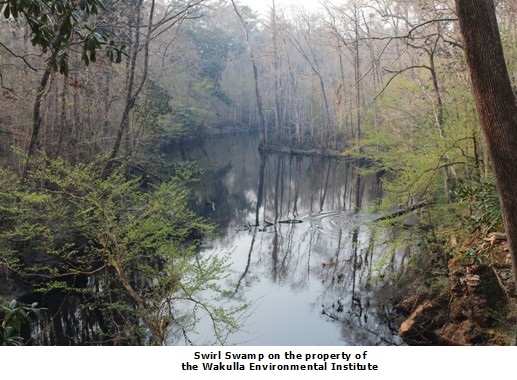Tallahassee Community College: TCC to Open Environmental Institute
Some might say that the most important part of Tallahassee Community College's (TCC) new Wakulla Environmental Institute (WEI) is already complete. After all, the breathtaking natural spaces that define TCC's recently acquired 158-acre property in rural Wakulla County, Florida, are destined to become the institute's most widely used classrooms. Nevertheless, it was with great excitement that the college broke ground for the institute's first building in April of 2013.
TCC President Jim Murdaugh and WEI Director Bob Ballard—with the help of TCC trustees and local and state dignitaries—celebrated the milestone before a crowd of more than 200. The college's main campus is in more populous Leon County, and although TCC already operates a small service center in Wakulla County, the college's leadership has long sought ways to expand TCC's presence in Wakulla in a manner that fits the character of the community.
The institute will focus on education and training programs that reflect the vast biodiversity of the region, which borders the Gulf of Mexico and is home to numerous rivers, springs, and other natural attractions. The facility will formally open to students in January of 2015 and is slated to offer associate degrees and college-credit certificates in hospitality and tourism management, aquaculture management, parks and leisure services technology, agribusiness management, and more. Instruction will be provided online in conjunction with outdoor field training. The institute already offers an associate's degree in environmental science technology and a water quality technician certificate through TCC's existing Wakulla Center and will also host noncredit programs, such as Green Guide Certification. The college plans to build energy efficient buildings that will be in keeping with the institute's focus on conservation.

One purpose of the institute is to promote the economic development of Wakulla County, which has been hit hard by the economic downturn, the Gulf oil spill, and declines in oyster and other fisheries. The hope is that WEI will increase Wakulla County's share of the growing ecotourism market and assist local residents in transitioning from traditional fishery-related employment to new jobs focused on the natural heritage of their community.
The institute recently graduated 10 oyster fishermen (and women) from a new program designed to help them learn oyster farming techniques. Oyster aquaculture has the potential to offer a more stable source of income than fishing does, and Wakulla County's coastal region is ideal habit for the tasty shellfish.
"This has the potential to revitalize the local oyster industry," said Ballard. "Farmed oysters help fertilize wild oysters, they encourage sport fish, and they are tremendous cleaners of the environment. Just a small parcel of land can house thousands of cages, which can produce hundreds of thousands of oysters."
The TCC Foundation is providing microloans to students so they can purchase the equipment they will need for the class, along with 100,000 oyster spat (larvae) per student. Once they graduate, students will keep the equipment and be ready to start farming.
Another innovation is an introductory professional diving course now being offered by WEI. The 16-week course targets students who wish to extend their skills in compressed-gas diving in order to support their work as research scientists or underwater crime scene technologists, or who seek a career in teaching diving or running a dive store or dive boat. Among future opportunities will be the eventual diving exploration of the natural cave system and sinkholes that run under the WEI campus, possibly linking the campus to the Gulf of Mexico.










